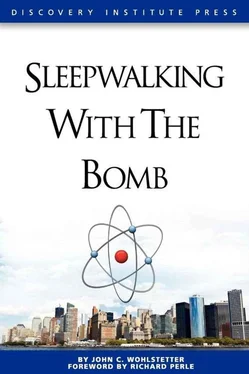John Wohlstetter - Sleepwalking with the Bomb
Здесь есть возможность читать онлайн «John Wohlstetter - Sleepwalking with the Bomb» весь текст электронной книги совершенно бесплатно (целиком полную версию без сокращений). В некоторых случаях можно слушать аудио, скачать через торрент в формате fb2 и присутствует краткое содержание. Город: Seattle, Год выпуска: 2012, ISBN: 2012, Издательство: Discovery Institute Press, Жанр: История, military, Политика, Публицистика, на английском языке. Описание произведения, (предисловие) а так же отзывы посетителей доступны на портале библиотеки ЛибКат.
- Название:Sleepwalking with the Bomb
- Автор:
- Издательство:Discovery Institute Press
- Жанр:
- Год:2012
- Город:Seattle
- ISBN:978-1-93659-906-6
- Рейтинг книги:3 / 5. Голосов: 1
-
Избранное:Добавить в избранное
- Отзывы:
-
Ваша оценка:
- 60
- 1
- 2
- 3
- 4
- 5
Sleepwalking with the Bomb: краткое содержание, описание и аннотация
Предлагаем к чтению аннотацию, описание, краткое содержание или предисловие (зависит от того, что написал сам автор книги «Sleepwalking with the Bomb»). Если вы не нашли необходимую информацию о книге — напишите в комментариях, мы постараемся отыскать её.
RICHARD PERLE, Resident Fellow, American Enterprise Institute and Assistant Secretary of Defense, 1981–1987 Sleepwalking with the Bomb
Sleepwalking with the Bomb — читать онлайн бесплатно полную книгу (весь текст) целиком
Ниже представлен текст книги, разбитый по страницам. Система сохранения места последней прочитанной страницы, позволяет с удобством читать онлайн бесплатно книгу «Sleepwalking with the Bomb», без необходимости каждый раз заново искать на чём Вы остановились. Поставьте закладку, и сможете в любой момент перейти на страницу, на которой закончили чтение.
Интервал:
Закладка:
In the end, the Russians decided not to challenge America directly by trying to land troops in the Mideast, but that month of October had been full of dangerous moments. Nuclear use, though unlikely, was not impossible in the crucible of an intense crisis engaging the fundamental foreign policy interests of both superpowers. Fortunately, in the 11 years since the Cuban Missile Crisis, the two superpowers had established instant communications and worked out protocols for managing crises. Though nothing is foolproof, such safeguards lessened the chances of a crisis escalating to a shooting war.
In the Yom Kippur War’s Mediterranean crisis phase, a Soviet decision to abort a Mideast airlift avoided possible shoot down of one or more Soviet transports. A shoot down would have triggered the first direct conflict between the superpowers since Berlin in 1961—and this time a shooting war instead of a tense standoff.
Militarily, China eventually may become strong enough to believe that in a shooting war close to home it would prevail. Such a calculation would partly be based upon a perception that America would, under the circumstances, pull its forces back. Were Chinese nuclear forces at numerical parity—or even, as was the case with Russia in 1973, nearing strategic nuclear parity—China might decide to take the chance. The Yom Kippur War model suggests that aggressive moves by covetous powers become bolder as military power grows. Nuclear weapons are regarded by such powers as trump cards. We may not see it that way, but they do. Resolute action may stave off catastrophe, as with Cuba in 1962. But of course there is no cosmic law that our luck will always hold.
Military confrontation is a traditional tool by which dictators distract domestic opposition. China’s autocratic leaders, though often temperamentally risk averse, might choose military confrontation if China faces one or more acute internal crises. Gaming the future always entails speculation. “Black swans”—low-probability but especially grave contingencies—have a habit of suddenly materializing. Call it Murphy’s Law of High-Stakes Geopolitics.
On top of growing military leverage, how much economic leverage does China wield, given its huge trade with America and massive U.S. securities and dollar currency holdings? China expert Gordon Chang points out that because China runs a trade deficit with the rest of its partners, its huge surplus with America makes it vulnerable to the consequences of a sharp drop in trade between the countries. In 2011 China ran a record $295.5 billion trade surplus with the U.S., up 90 percent from 2008. Its 2011 surplus was 190.5 percent of its overall net trade surplus, as it ran a deficit with the rest of the world. This factor limits U.S. vulnerability to blackmail by Beijing. Further, huge debtors enjoy a perverse leverage over creditors that small debtors lack. Thus the old adage: “Owe the bank a million, you have a problem. Owe the bank a billion, the bank has a problem.” Add three zeroes for country debtors and the same principle can apply: Owe a country a billion, the debtor has a problem. Owe a trillion, the creditor has a problem. Put simply, huge creditors simply cannot afford to have a mega-debtor go under. If Uncle Sam goes belly up, China’s export-driven economy sells far fewer goods.
China does, however, derive considerable leverage from producing more than 90 percent of the world’s rare-earth elements. This odd series of metallic elements lies just above uranium and plutonium on the periodic table. Half bear names that relate to their discovery in the Swedish island village of Ytterby. They are essential for numerous high-technology applications in computers and specialized equipment. China’s near-monopoly gives it strategic leverage in a future crisis. Though deposits of such elements exist outside China, their extraction elsewhere is more costly. China accepts a level of extractive pollution that Western countries will not tolerate. Were China to put an embargo on rare-earth elements, economies dependent on them—every modern one—would be harmed as rare-earth element prices rose. Their production elsewhere, pollution notwithstanding, would become essential to the West.
America and Australia are now investing in alternate, though higher-cost, supply sources. And because Beijing inflated prices and thus encouraged alternative investment, rare-earth commodity prices are sharply down from their 2010 peaks. Yet because Beijing is potentially in a monopoly position, importing states have strong incentives to continue building alternate facilities, and firms have a strong incentive to seek substitute products where technically feasible.
China and the U.S. are rivals, not mortal enemies. China has too many interests that intersect with American ones to permit real enmity. But China’s yearning to restore the position of power it enjoyed six centuries ago is real. Failure to recognize this and deter Chinese pressure in the western Pacific could lead to a war no one wants. And any shooting war between nuclear powers inherently carries risks of unintended escalation to a nuclear exchange.
Chinese leaders are rational actors, most of whom would not encourage escalation where risk of nuclear conflict exists. But it would take only one bold leader willing to run greater risks than his predecessors—who believed, as Soviet boss Leonid Brezhnev did, that the “correlation of forces” is shifting decisively in his country’s favor—to focus China’s immense energies on triumph in the western Pacific. The Soviet leadership had often been cautious, wary of the immense power of the United States. Yet Leonid Brezhnev was opportunistically tempted in 1973 to take a chance in the Mideast, even with the memory of Nikita Khrushchev’s failed 1962 gamble over Cuba—which Khrushchev, unlike Brezhnev, had planned in advance. Conceivably a Chinese leader might be similarly tempted.
Consider the warning that Lieutenant General Xiong Guang issued to the Clinton administration during the 1996 crisis in the Taiwan Strait, after the U.S. sent the Seventh Fleet into the strait to warn against Chinese military action. The Chinese were trying to intimidate Taiwan during its presidential election campaign, during which the question of seeking permanent independence from the mainland took center stage. The general expressed doubt that America would trade Los Angeles to avenge a Chinese nuclear strike against Taipei.
Herman Kahn warned that strategic gambles by national leaders have been frequent in history: “We tend to forget that throughout history many decision-makers were delighted to accept ‘double or nothing’ tactics if the odds looked sufficiently favorable.” Shifts in the nuclear balance can matter, if—as proved the case in 1973—they change how leaders behave during a crisis. Perceived vulnerability, whether in force structure, force deployment, or will to prevail, can tempt an adversary to take a reckless, potentially catastrophic gamble. U.S. policy, particularly regarding its nuclear arsenal, must focus on making sure China always considers the odds of such a gamble hugely unfavorable.
At the root of miscalculation in a Yom Kippur type of confrontation is the seductive trap of mirror imaging: believing an adversary assesses the nuclear balance the same way, and regards nuclear arsenals as only for last-ditch deterrence purposes. We can avoid such mistakes if we keep in mind that assessments of the nuclear balance are not intellectual exercises in philosophical pure reason. They turn rather on prosaic everyday factors—specifically, what adversaries think, which can be quite different from what America thinks.
This is especially true as to revolutionary and rogue powers, but also can apply to rivals. It forms the basis for the Fifth Lesson of nuclear-age history: THE NUCLEAR BALANCE MATTERS IF ANY PARTY TO A CONFLICT THINKS IT MATTERS, AND THUS ALTERS ITS BEHAVIOR.
Читать дальшеИнтервал:
Закладка:
Похожие книги на «Sleepwalking with the Bomb»
Представляем Вашему вниманию похожие книги на «Sleepwalking with the Bomb» списком для выбора. Мы отобрали схожую по названию и смыслу литературу в надежде предоставить читателям больше вариантов отыскать новые, интересные, ещё непрочитанные произведения.
Обсуждение, отзывы о книге «Sleepwalking with the Bomb» и просто собственные мнения читателей. Оставьте ваши комментарии, напишите, что Вы думаете о произведении, его смысле или главных героях. Укажите что конкретно понравилось, а что нет, и почему Вы так считаете.












